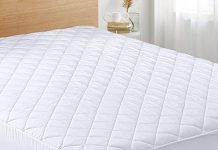Are you finding it more and more challenging to get a good night’s sleep?
Do you wake up feeling achy and unrested? It might be time for a new mattress!
This article will explore the telltale signs that your mattress is past its prime and ready to be replaced.
From sagging and lumps to allergies and discomfort, these signs will help you determine if it’s time to say goodbye to your old mattress and hello to a comfortable and rejuvenating sleep experience.
Review contents
Physical Signs
Body Pain
One of the most common signs you need a new mattress is experiencing body pain. Wake up in the morning with aches and pains in different body parts.
It may indicate that your mattress no longer provides the necessary support to alleviate pressure points. Over time, mattresses can lose their firmness and begin to sag, leading to spine misalignment and muscle tension, resulting in body pain.
Sagging
Another physical sign that it’s time for a new mattress is sagging. Over time, mattresses can develop visible indentations or areas of sagging where the most pressure is applied.
When you lie down on your mattress and notice that it is no longer providing a flat and even surface, it’s a clear indication that the support system is compromised. This can lead to poor sleep posture and restless nights as your body struggles to find a comfortable position on an uneven surface.
Tossing and Turning
Find yourself tossing and turning throughout the night, unable to find a comfortable position. It may indicate that your mattress no longer provides comfort and support.
When a mattress loses its ability to contour your body and adapt to your movements, it can result in restless sleep. Constantly shifting positions to find relief can disrupt your sleep cycle and leave you groggy and tired in the morning.
Visible Wear and Tear
Visible wear and tear on your mattress is an obvious sign that it’s time for a replacement. Look for signs such as frayed edges, exposed springs, or bulging areas.
These visual cues indicate that your mattress has reached the end of its lifespan and can no longer provide the comfort and support necessary for a good night’s sleep. Investing in a new mattress is always advisable if you notice extensive wear and tear to ensure your sleep quality is not compromised.
Allergies and Respiratory Issues
Persistent Allergies
If you suffer from persistent allergies, such as sneezing, runny nose, and itchy eyes, even when you don’t have any apparent triggers, your mattress may be the culprit.
Over time, mattresses can accumulate allergens like dust mites, pollen, and pet dander, exacerbating allergy symptoms. Regular cleaning may alleviate the issue temporarily, but if your allergies persist, it might be time to consider a new mattress.
Wheezing and Coughing
Wheezing and coughing can indicate that your current mattress affects your respiratory health. Mold, mildew, and dust mites are common allergens that can thrive in an old mattress.
These allergens can trigger respiratory issues, especially in individuals with asthma or allergies. Suppose you notice an increase in wheezing or coughing while lying down or immediately upon waking up. In that case, it’s essential to evaluate the condition of your mattress and consider replacing it if necessary.
Difficulty Breathing
Difficulty breathing during the night is a severe concern that should not be ignored. If you frequently wake up gasping for air or feeling short of breath, it may be a sign that your mattress hinders your ability to breathe correctly.
An old mattress can sag in a way that restricts your airways, causing breathing difficulties, especially for individuals who sleep on their stomach or side. It’s crucial to prioritize your respiratory health and invest in a mattress that promotes better breathing and overall sleep quality.
Sleep Quality
Restlessness
Restlessness during the night can significantly impact the quality of your sleep. If you constantly shift positions and cannot find a comfortable spot, it’s a sign that your mattress no longer provides the necessary support and comfort.
Restlessness can prevent you from entering deep, restorative sleep stages, leading to daytime sleepiness and reduced cognitive function. Investing in a new mattress that meets your comfort needs can significantly improve your sleep quality and overall well-being.
Insomnia
If you frequently struggle with falling asleep or staying asleep throughout the night, it may be a sign that your mattress is not conducive to quality sleep.
An old, worn-out mattress can contribute to insomnia by causing discomfort and pain, making it challenging to relax and drift off to sleep. Insomnia can hurt your mental and physical health, so addressing any issues with your mattress contributing to your sleep difficulties is essential.
Frequent Awakening
Waking up frequently during the night disrupts your sleep cycle and prevents you from getting the restorative sleep your body needs.
If you wake up multiple times during the night for no apparent reason, it may be a sign that your mattress no longer provides adequate support or cushioning. A high-quality mattress should facilitate undisturbed sleep, allowing you to stay asleep throughout the night and wake up refreshed and energized.
Age of the Mattress
Recommended Lifespan
Every mattress has a recommended lifespan, usually 7 to 10 years. Over time, the materials in a mattress break down, losing their supportive and comfortable qualities.
Even if your mattress looks fine on the surface, it may have deteriorated internally, leading to a decline in sleep quality. It’s crucial to know your mattress’s recommended lifespan and consider a replacement once it reaches that point.
Mattress Age
If you’re unsure how long you’ve had your mattress or if it has been a significant amount of time since you last replaced it, it’s essential to evaluate its condition.
As mattresses age, they lose their ability to provide proper support and comfort. The wear and tear become more evident, and the materials become less resilient. If your mattress is approaching or surpassing the recommended lifespan, it’s time to explore new options to ensure a good night’s sleep.
Changes in Weight
Weight Gain or Loss
Significant weight changes can affect your mattress’s ability to provide adequate support. If you have recently gained or lost a significant amount of weight, your current mattress may no longer be suitable.
Weight gain can put extra pressure on your mattress, leading to sagging and reduced support. On the other hand, weight loss can result in less cushioning, leaving you feeling uncomfortable and unsupported during sleep. Assessing and accommodating your changing weight by selecting a suitable mattress can help maintain proper spinal alignment and overall sleep quality.
Body Shape Changes
As our bodies change, so do our sleep preferences and needs. Pregnancy, aging, or injuries can alter our body shape, resulting in different comfort requirements during sleep.
A mattress that once provided optimal support and comfort may no longer suit your changing body shape. If you notice that your body shape has significantly changed, choosing a mattress that accommodates those changes is essential, ensuring a restful and comfortable night’s sleep.
Partner Disturbance
Motion Transfer
If you’re easily disturbed by your partner’s movements during sleep, it may be due to inadequate motion isolation in your current mattress.
An old or low-quality mattress can transfer motion across the surface, causing disruptions whenever your partner tosses, turns, or gets in and out of bed. This can lead to fragmented sleep and make you tired and irritable in the morning. Investing in a mattress with excellent motion isolation can significantly reduce partner disturbance and improve sleep quality for both individuals.
Rolling Together or Apart
Rolling towards the center of the bed while sleeping with a partner or constantly drifting apart may be a sign of poor mattress support.
An old mattress can lose its edge support, causing you and your partner to sink towards the center or slide towards the sides. This can disrupt sleep and lead to discomfort throughout the night.
Consider investing in a mattress that provides adequate edge support, keeping you and your partner comfortably centered and preventing unnecessary rolling together or apart.
Hygiene and Cleanliness
Visible Stains and Marks
Visible stains and marks on your mattress can be unsightly and indicate poor hygiene. Over time, spills, sweat, and body oils can seep into your mattress, resulting in stains and discoloration.
Stains not only affect the overall appearance of the mattress but can also contribute to the growth of allergens such as mold and mildew. If your mattress is marked with noticeable stains that cannot be easily removed, it’s a good idea to replace it to maintain a clean and hygienic sleep environment.
Dust Mite Infestation
Dust mites are microscopic creatures that thrive in mattresses and feed on dead skin cells. These tiny pests can cause allergies, trigger asthma attacks, and worsen respiratory conditions.
If you suffer from persistent allergies or experience worsening respiratory symptoms, dust mite infestation may be the cause. Regular cleaning can help eliminate dust mites temporarily, but an old mattress may be contaminated beyond repair. A fresh mattress can provide a clean and allergy-free sleep environment, promoting better overall health.
Unpleasant Odors
Over time, mattresses can accumulate moisture, sweat, and spills, resulting in unpleasant odors. If you notice a lingering smell on your mattress that cannot be eliminated through cleaning or airing, it’s a sign that the mattress has absorbed and retained unpleasant odors.
Sleeping on a mattress with an unpleasant odor can disrupt your ability to fully relax and enjoy restful sleep. In such cases, investing in a new mattress can help create a fresh and inviting sleep environment.
Financial Investment
Value for Money
Mattresses can be a significant financial investment, but they are well worth considering their impact on your sleep quality and overall well-being. When you purchase a high-quality mattress that meets your comfort needs and supports your body correctly, you invest in better sleep and improved health.
By prioritizing value for money when selecting a new mattress, you ensure that you’re making a wise investment that will provide long-lasting comfort and sleep satisfaction.
Increased Comfort and Productivity
Investing in a new mattress not only improves your sleep quality but also enhances your overall comfort and productivity during waking hours.
A comfortable mattress that aligns your spine, cushions pressure points, and reduces partner disturbance can help you wake up feeling refreshed and revitalized.
A new mattress can boost your energy levels, improve focus, and enhance your productivity throughout the day by ensuring you get the restorative sleep you need. It’s a worthwhile investment that pays dividends in multiple aspects of your life.
Personal Preference
Change in Sleep Position or Preferences
As our bodies change over time, our sleep positions and preferences may also evolve.
If you find yourself shifting from one sleep position to another or developing different comfort requirements, it’s essential to address these changes when considering a new mattress.
Whether you prefer a firmer or softer feel, adequate support for specific pressure points, or enhanced motion isolation, choosing a mattress that aligns with your current sleep preferences will significantly contribute to a better night’s sleep.
Needed Features or Technology
Advancements in mattress technology have introduced various features designed to enhance sleep comfort and convenience.
If you need specific features or technology to improve your sleep experience, it may be time for a mattress upgrade. Whether it’s temperature regulation, adjustable firmness levels, or built-in intelligent features, selecting a mattress that caters to your needs will contribute to a more personalized and satisfying sleep routine.
In conclusion, paying attention to the signs that you need a new mattress is crucial for maintaining optimal sleep quality and overall health.
Physical signs such as body pain, sagging, tossing and turning, and visible wear and tear indicate that your mattress no longer provides the necessary support and comfort.
Allergies and respiratory issues, changes in sleep quality, age of the mattress, changes in weight, partner disturbance, hygiene and cleanliness, financial investment, and personal preference are all factors to consider when evaluating the condition of your mattress.
By recognizing these signs and addressing them promptly, you can invest in a new mattress that promotes better sleep, improving your overall well-being and quality of life.































